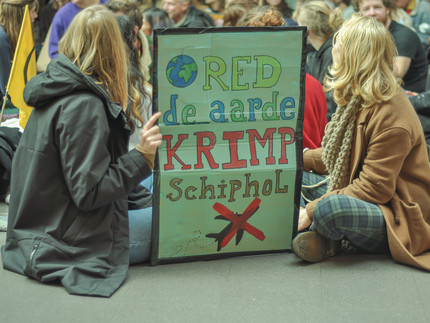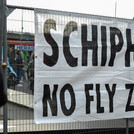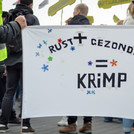Protesting global air transport in Europe
Unterstanding the complexity of airport spaces
Airports are key infrastructure needed for many societal needs. The most obvious function of airports is probably the transport of people, including not only tourists but businesspeople, as well as those visiting friends and family. For these travelers, the airport is also a space of leisure, with a wide variety of shops and amenities. For example, the new airport in Istanbul inaugurated its own museum in 2020 with a collection of Turkish artifacts. With the increasing relevance of online shopping, airports are also important because of their cargo services, playing an essential role in the global market of flowers and other time-sensitive products. While some airports are smaller and only connect with the domestic market, international airports are also the spaces where a visitor can legally cross a border, which partially explains why airports are also spaces of securitity and surveillance. For aviation representatives and national politicians, airports are essential for economic growth and job creation, and they oftentimes provide their regions or countries the necessary interconnection with global networks, making them more competitive and attractive. During times of national crisis and emergency, airports could be used to transport and storage whatever a country needs, from medical equipment to canned food. Although the airport might appear as a closed space, frequently surrounded by a fence, airports are indeed semi-open systems. Oil flows in, trash is taken out. The PROTEST-AIRT project explores another function that airports seem to have in contemporary societies: Their role as spaces of dissent.
When one thinks about political participation, airports rarely come to mind. However, there is extensive evidence that airports have been essential for the performance of some democratic rights. In the 1960s-1970s, when hijacking was a serious risk for passengers and crews alike, several protests took place at the airports demanding safety measures. Animal rights activists have protested at airports too, denouncing the role played by airlines in the transport of animals for medical testing. Boycotts and demonstrations have targeted airports to censor the domestic or foreign policy of a country, as happened with protests against South Africa during the apartheid. However, in recent years, protests at the airport have been characterized by the concern about the environmental impact of air transport, particularly in the context of the climate emergency.
The expansion of Leipzig/Halle Airport (LEJ)
Cargo is part of the normal functioning of any airport and the growth of the e-commerce sector has created new challenges for our contemporary societies. There are companies that dedicate exclusively to the transport of goods (for example, DHL or UPS), while airlines carry general cargo as well as passengers. The projected expansion of the Leipzig/Halle airport must be understood under this scenario. For aviation representatives and local or national authorities, air transport cargo is a good investment in terms of economic growth and job creation. According to their own website, the Leipzig/Halle Airport is the fourth largest cargo hub in Europe with an estimated freight volume of around 1.51 million tons. The competition between airports for capturing diverse markets is also well-known, and it could be similar to the competition between global cities or nations, constantlly devising strategies to attract talented people or businesses and corporations. Branding plays a huge part of this global competition, and this could explain why the Leipzig/Halle Airport was depicted in the Hollywood blockbuster "Captain America: Civil War", a movie part of the Marvel Cinematic Universe (MCU).
However, the projected expansion of the Leipzig/Halle Airport has caused concern and dissatisfaction for many local inhabitants and environmental activists. In a recent protest in July 2022, collectives such as Am Boden Bleiben and Transform LEJ advocated for the protection of the planet, highlighting the role that increased air freight might play in aggravating the climate crisis. The constant flights taking off and landing were also a motivation for these activists, who demonstrated with banners against aircraft noise and demanded the protection of their right to sleep. Several scientific studies have warned of the risks that aircraft noise implies for local inhabitants, which go beyond annoyance and include serious threats such as cardiovascular disease or stroke.
The protests, which consisted of a vigil in Leipzig and a demonstration in Schkeuditz, also included campaigning against other potential political uses of an expanded Leipzig/Halle Airport, particularly those linked to military purposes or deportations.
Is Schiphol Airport too big?
Undoubtedly, Amsterdam Airport Schiphol is one of the most importants airports for the Netherlands and for Europe in general. Every day, thousands of travelers move through the airport, including both those who are visiting the country and passengers in transit to other destinations. The airport is the hub of KLM and it has been designed to provide travelers with a lot of amenities, including a library with a piano and a meditation centre, as well as several shops and restaurants. Schiphol Plaza connects the airport to the railroad system, with frequent trains to nearby cities such as Amsterdam and Rotterdam. Scholars have analyzed the 'Schiphol region' and its economic transformation, describing how the airport has impacted the surrounding areas, tracking the emergence of industries, hotels and warehouses. The connection Kenya-Netherlands, as stated in their own Schiphol Cargo website, is essential to maintain a seamless global supply chain of various flowers, and it explains how real monitoring and technology contribute to keep the roses fresh.
The activism against Schiphol Airport is as old as the airport itself. Once again, the impact of aircraft noise has been documented in many studies, and collectives such as SchipholWatch have designed the app Explane that allows citizens to track the noise levels of each passing aircraft. The data is collected worldwide and open access for all, including reports for United Kingdom or Australia. In 2019, before the pandemic paralyzed air transport, a Protestival was held by Greenpeace Nederland and other environmental groups, and several activists were carried out of Schiphol Plaza by local police. The protest included music and performances, and the participants carried signs with phrases such as 'tax the plane, take the train' and 'no jobs on a dead planet'.
Last November 2022, another protest took place at Schiphol Plaza, with the support of collectives such as Scientist Rebellion Netherlands. The demonstrators included people of all ages, and they marched both outside and inside the airport carrying political banners with poignant messages about the urgency of the climate crisis. A group of young protesters also sat down and sang while holding hands, and both travelers and airport personnel enjoyed the creativity of the protest and filmed it with their phones. Other activists decided to use a more 'controversial' approach that day, and they entered the platform with their bikes and chained themselves to several private jets. Indeed, protests against private jets are not new, and there have been blockages in France and United Kingdom too. As it is reported in various scientific publications, wealthy citizens are particularly responsible for a huge amount of GHG emissions, as a result of their luxurious lifestyles.
For many of these environmental activists, the degrowth of aviation is needed to tackle the climate crisis. The technological solutions proposed by the industry are too far away, and there are serious challenges that must be overcome before they are implemented at mass scale (if feasible at all). However, new airport expansion projects are emerging everywhere, and the protests follow these projects. Recently, young activists demonstrated in Albania against the expansion of the Vlora International Airport, arguing that the project is a threat to a local bird sanctuary (inhabited by flamingos, pelicans and other 200 species). The North Forest Defense, a collective in Türkiye, also campaigned for the protection of green spaces that were 'needed' for the new Istanbul Airport.
The following gallery shows some images of the protest at Amsterdam Airport Schiphol last November 2022.








